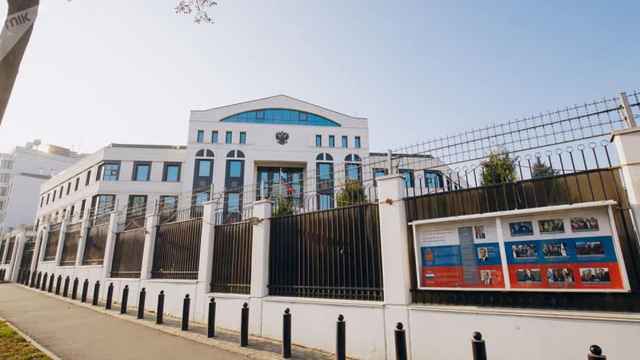Start-ups, business angels and venture funds — these terms have become part of the Russian language, although just a few years back they were almost completely absent from the local dialect.
High-tech business in Russia is expanding rapidly and being part of it is now considered "cool" as thousands of young entrepreneurs flock to venture funds with ideas and hopes of one day making their first million dollars. However, its growth has been stunted by excessive bureaucracy, the tiny domestic market for high-tech products and the slim chances of launching an IPO on the Moscow Exchange. The political standoff between Russia and the West over Ukraine has made things worse still.
According to a recent joint report prepared by the Russian Venture Company and the PwC Center for Innovation and Technology, the amount of "exits" from Russian start-ups — when a venture fund sells its stake — in 2013 amounted to $2 billion, fives times more than in 2012. The volume of investments channeled into the sector in Russia in 2012 was greater than that received by Israel, a developed venture industry country. More than 80 percent of all investment last year, or more than $600 million, went into the IT sector, as was the case in 2012.
The results are encouraging, but the few who have been in the industry long enough to have set up companies and sold them on for a hefty sum are not so optimistic about its short-term prospects.
The Moscow Times has asked several Russian businessmen who are prominent in the start-up industry to share their views on the current investment climate in their sphere. The interviews have been edited for length and clarity.
1. Alexander Galitsky, co-founder of Almaz Capital Partners. Founded in 2008, it has raised more than $100 million and invested in companies such as Yandex, Nival and Parallels:
Russia is not among the global leaders in innovation technology, but no country is currently capable of rolling out products that have been fully conceived and manufactured within its own borders, and that includes military hardware.
Technological integration is highly developed, so Russia needs to find its own niche where it can make its own contribution to the world of innovation technology.
I invest in IT technology because it will play a more and more important role in the future. Take the medical industry for instance, 80 percent of it is based on IT technology. The same goes for energy efficiency technology. Potentially, Russia can play an important role here.
Today, major IT companies are opening branches in Russia so that they can get access to talented engineers. Europe needs about 200,000 professionals who can analyze large quantities of data, but its universities annually squeeze out only 50,000 specialists with the relevant backgrounds in maths and engineering. This is where Russia can come in, with its traditionally strong standards of maths and physics tuition. Russia also has great potential for providing entrepreneurs with the knowledge of the industry they need to start their own businesses.
For companies similar to the magnitude of Google or Facebook to emerge in Russia, many pieces of the puzzle have to come together, for example, government support, and the organization of research in the right areas.
In recent times, Russia has improved considerably in this regard — the quality of investment, the amount of interesting proposals, and the number of promising people in the industry have all increased.
2. Igor Ryabenky, a business angel with 20 years of experience in helping IT, biotech and Internet start-ups. He is a managing partner at Altair Capital, a leading Russian seed-stage venture fund:

Most people in the start-up business in Russia are preoccupied with their idea and don't understand that getting up and running requires everyday hard work. The movement here has just started and people only think of it as a new trend, whereas in the West it is a long-standing practice. People I meet there have already been involved in several projects while in Russia they are often first time entrepreneurs.
Both Russians and Westerners are also seeing more risks associated with investing in Russian businesses than before. Due to the events in Ukraine, many start-ups cannot unearth support from the next wave of venture funds, as Western ones have already gone and many Russian funds have also turned their back on the domestic market. If, however, a project is well grounded, it can enter Western markets with no problems.
3. Dmitry Chikhachev, a managing partner at Runa Capital, which invests in the software, Internet and mobile sectors. It has created or helped develop companies worth $10 billion in assets:

The export of IT products from Russia has been growing by about 30 percent every year for the last 12 years, reaching $5 billion in 2013. We expect this to grow further.
Russia has its own pluses, the first being good schooling in engineering. This may sound odd, but Russian engineers are not afraid to challenge authority. Maybe it is not so evident in other areas but in the engineering sphere it exists. This is the essence of innovation culture.
Also, Russia has a unique culture and a relatively large IT market, so there is a domestic market for Russian start-ups. That is why there are such companies as the social network Vkontakte or the 1C accounting software company, which focus on the domestic market and, more specifically, on the Russian-language market.
Although the dawn of the IT industry in Russia began much later than in the U.S., a number of powerful Russian competitors have emerged and a few quite strong software products have been developed for export.
Acronis, Parallels, VMware and ABBYY are not as large as Google, but they lead the way in their own markets.
Money arrived before people and ideas and that is why start-ups have not been developing as fast as they could. There are very few business angels because the first wave of entrepreneurs in this industry is still involved in managing their own start-ups. They are not yet ready to mentor others. But as the number of successful businessmen grows, so too will the number of mentors and a chain reaction will be triggered.
4. Max Tsypliaev, founder, president and chief of software companies Acronis and Comindware:

My company, Acronis, entered into the vast, multi-billion dollar market of data protection and recovery in 2001, but most of this market was not in Russia.
The first countries we started to sell to were in North America, German-speaking European countries and Japan. These were the major markets for Acronis and are our target for Comindware, a new company that operates in the niche of work management solutions. Together these countries make up 80 percent of the global IT market.
From the very start we established ourselves as a company whose technological and scientific potential was in Russia, while sales and marketing went global.
Russia has well educated and professional engineers. Also, the share of top quality programmers in the general population is much higher here than in other countries, but people here do not know how to sell and promote their products.
Russia has not yet become a large IT market for several reasons. The first is historical background. A long transitional phase followed the collapse of the Soviet Union. During this time IT was, strictly speaking, way down the "to do" list. Currently, Russia is still several years behind other countries in terms of introducing IT products.
Another reason why there hasn't been a breakthrough in this area, and this is no secret, is that the economy remains highly resource-oriented. If you have been addicted to a hydrocarbon needle for a long time, the question is, why should you change to something else? Until recently there was no stimulus to try something different.
Productivity in Russia is on average two to five times lower than in developed countries. This is not because Russians are lazy. It comes from Russia lagging behind in applying technology, including IT. Even in the oil sector, leading Russian companies are technologically behind their Western counterparts.
As soon as companies start to plan not just one to three years ahead but at least 10 years, a lot will change in terms of investment. Short-term planning does not require technology, it is better to save money instead. A decade-long strategy is different, this time span would demand technological advance. This type of planning is common for large Western companies but for Russia this is not yet the case and that means the IT market will probably stay at its current level.
It should be part of government policy to divert the economy from just exploiting the resource base and now, it seems, the need for that is being stressed. Projects like the Skolkovo innovation center can help teams start their own businesses, and as more of them appear, a positive trend occurs. But Skolkovo and other techno-parks have begun to emerge only recently, and the effects from them won't really be felt for 10 years.
5. Sergey Gribov, former partner at venture fund Minerva Capital, now managing partner at StartUp Access, a consulting and marketing strategy agency serving early-stage technology, healthcare, and Internet services companies:

One big problem for any start-up is "exit" — when a venture fund sells its stake. These fund invests in start-ups with a view to cashing after five to seven years. But who do you sell to in Russia? Yandex or Mail.Ru and that is basically it, which is not serious.
It would not be so bad if it was just a matter of price, but it is actually worse than that. For most U.S. companies, buying a Russian one today presents an unacceptably high risk. It is all a matter of trust, which builds slowly and breaks down quickly.
Also, the number of business angels here is very few. In the U.S., a start-up can find money from a syndicate of business angels. Each may put in a small amount but collectively it makes up for a large sum. It works both ways — a start-up gets money and guidance and angels can find safety in numbers by investing in dozens of them in hope for one to win big.
Bureaucracy is another drawback. I recently had two deals, both in the range of $500,000. One was tied to the U.S. legal system, the other — to the Russian one. In the U.S. there were two documents, five pages each, which people signed remotely. In Russia it was a crazy pile of paper we physically spent 40 minutes signing.
But there has been some progress in each area. Things did not happen overnight in the U.S., either.
Contact the author at a.panin@imedia.ru
A Message from The Moscow Times:
Dear readers,
We are facing unprecedented challenges. Russia's Prosecutor General's Office has designated The Moscow Times as an "undesirable" organization, criminalizing our work and putting our staff at risk of prosecution. This follows our earlier unjust labeling as a "foreign agent."
These actions are direct attempts to silence independent journalism in Russia. The authorities claim our work "discredits the decisions of the Russian leadership." We see things differently: we strive to provide accurate, unbiased reporting on Russia.
We, the journalists of The Moscow Times, refuse to be silenced. But to continue our work, we need your help.
Your support, no matter how small, makes a world of difference. If you can, please support us monthly starting from just $2. It's quick to set up, and every contribution makes a significant impact.
By supporting The Moscow Times, you're defending open, independent journalism in the face of repression. Thank you for standing with us.
Remind me later.






